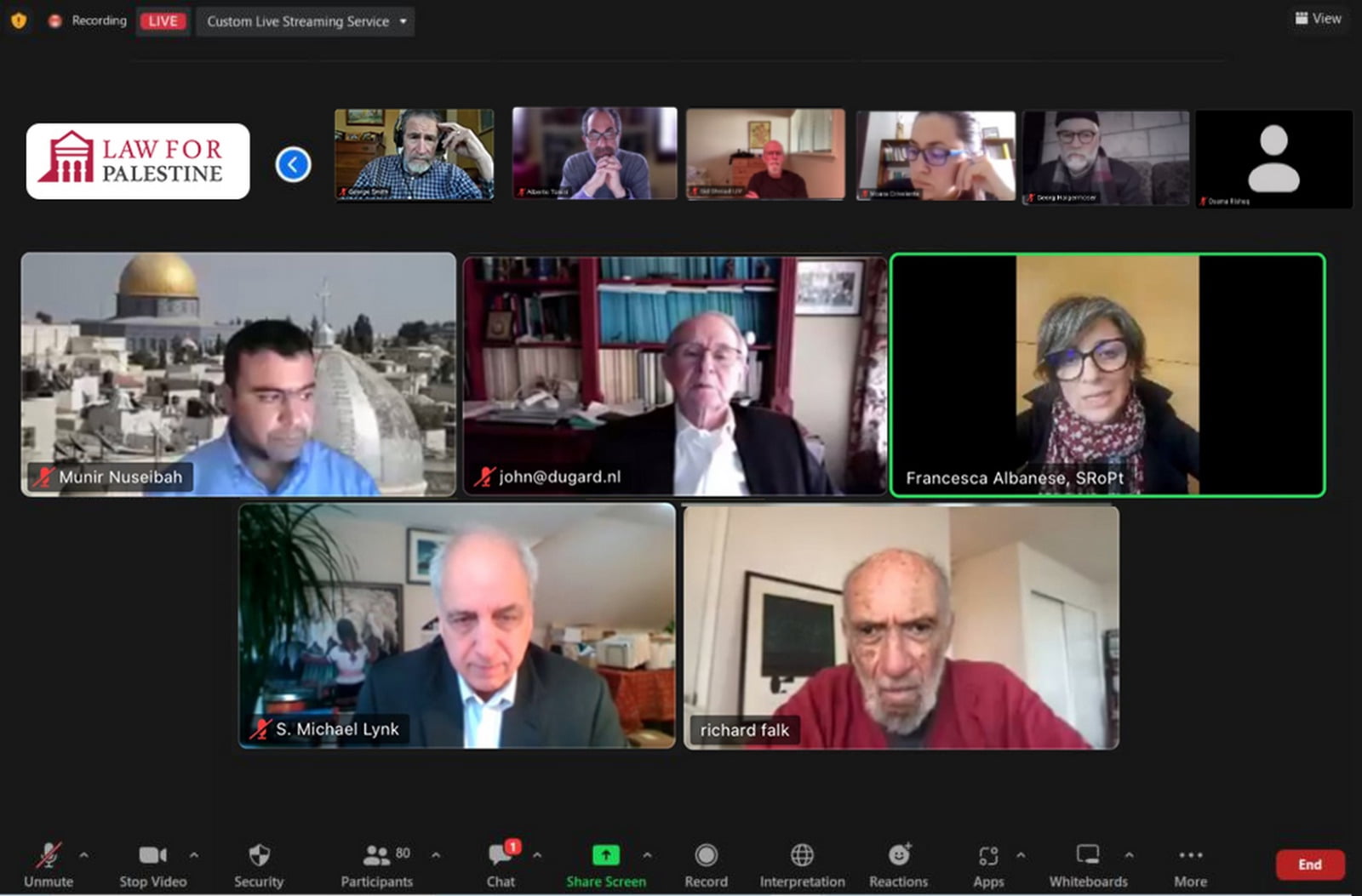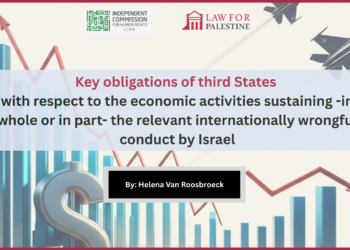In partnership with Law for Palestine, Al Quds University Human Rights Clinic have organized an online launch for the recently released book titled “Protecting Human Rights in Occupied Palestine: Working Through the United Nations”. The event, which was held on 29th April 2023, hosted the three authors of the book, former UN Special Rapporteurs and prominent legal experts: Prof. John Dugard, Prof. Richard Falk, and Prof. Michael Lynk, as well as the current UN Special Rapporteur Dr. Francesca Albanese who forwarded for the book. Together with 120 participating legal experts and researchers, the Special Rapporteurs discussed the most important outcomes of the book and the ways forward for the question of Palestine within the UN System. The book focused on both the positive role played by the UN in solving the question of Palestine in a politically controversial area as well as its blockage by geopolitical forces preventing it from securing the implementation of international law.
The event, that was held online via zoom and broadcasted via social media platforms, was moderated by Dr. Munir Nuseibah, an assistant professor at Al Quds University and member of Law for Palestine Board of Trustees.
Albanese: The book contributes toward shifting the legal debate on the question of Palestine
In her intervention, the Current UN Special Rapporteur on Palestine has expressed her delight and pride to hold the torch and complete the path laid out by her predecessors, the three authors of the book.
“The book is exceptional in many ways because of the nature, the character, and the scholarship of each contributor as a legal expert and also of them being special rapporteurs who served on the mandate of Palestine” Albanese added. She argued that the book uplifts the debate on the question of Palestine through providing a holistic approach to international law, and through pointing at legal facts that are often missing from the dominant debate on the human rights situation in Palestine.
She concluded by listing three main aspects that can be captured through the book: First, the worsening of the situation on the ground across the oPt. Second, the shared struggles and challenges faced the previous special rapporteurs during their mandates despite their different personalities. Third, that the collective and individual experience of the special rapporteurs shows that there is no option but to respect the international law in order to solve the tragic reality facing the Palestinians.
Falk: The book highlights the UN’s gradual acceptance of a shift in the discussion from evaluating human rights conditions towards discussing terms such as apartheid
Professor Richard Falk began by explaining that the idea of the book emerged from their recognition of the immense value of the collective experience of UN Special Rapporteurs. He elaborated that drawing on a period of two decades of experience of UN Special Rapporteurs on Palestine reveals much more than what an individual’s experience could uncover. Here comes the importance of this collaboration: to shed light on two important points that are often overlooked. First, to highlight the gradual acceptance, at the UN-level, of political changes that are related to the situation in Palestine. For example, there is a shift from merely evaluating the human rights conditions in Palestine towards discussing holistic terms such as apartheid. Second, to reveal the systematic criticism directed towards each Special Rapporteur during their mandate, proving the Israel’s attempt at shifting the conversation from law and human rights to questioning the credibility of the Special Rapporteur.
On the other hand, Prof. Falk argued that Israel’s continuous campaigns to question the credibility and defame the reputation of the Special Rapporteurs have, in one way or another, in fact contributed toward shedding light on the work of Special Rapporteurs. Israel’s use of the anti-Semitic tactic to criticize anyone who criticizes its actions has led to increased media attention on the work of the Special Rapporteurs, Prof. Falk concluded.
Dugard: There are double standards from Western Countries and the US when it comes to Palestine
Prof. John Dugard talked about the obstacles and challenges he encountered during his mandate as a Special Rapporteur. While recalling some positive encounters such as the possibility, at his time, to visit both the occupied Palestinian territories and Israel, he mentioned that he faced opposition from Israelis at the UN in Geneva and New York regarding his work and his call for an advisory opinion from the ICJ in 2004. Furthermore, Prof. Dugard drew attention to the double standards of Western countries in relation to the question of Palestine. He explained that the attitudes of the US and European countries are influenced by their guilt over the Holocaust, leading them to support Israel. Prof. Dugard concluded by stating that the international civil society believes that an apartheid system exists in the Palestinian territories, but political actors in the West have not yet acknowledged it.
Lynk: Apartheid can no longer be overlooked in the West Bank, Gaza, and East Jerusalem
During his remarks, Prof. Michael Lynk, addressed how the human rights evaluation in Palestine has evolved over the course of the years, particularly the rise of the use of the term apartheid among international organizations to describe the human rights situation in Palestine. Tackling the last report issued during his mandate, Prof. Lynk dived in depth about his experience in issuing his last report. “When I was appointed to be a special rapporteur in 2016, I said to myself I am not going to use the term apartheid, I believed at that time that this might close the door for any political and diplomatic solutions. However, at the end of my mandate I have read many reports from international organizations and came to the conclusion that there is an apartheid in the West Bank, Gaza, and East Jerusalem”, he stated.
Prof. Lynk concluded by sharing his insights and advice for civil society and human rights activists advocating for Palestinian people’s rights. Speaking from his experience working with the UN decision-making tools, Prof. Lynk highlighted the significant military and diplomatic relationship between the US and Israel and the way this complicates the Palestinian scene at the UN. He noted that the US has used its power of veto within the Security Council to influence the UN decision-making process concerning decisions about Palestine, which has hindered the efforts of those advocating for justice. For instance, Prof. Lynk emphasized that the US is the only country among the five permanent members of the Security Council that has used the veto over resolutions criticizing Israel. This has had a considerable impact on the UN’s ability to address the human rights concerns of the Palestinian people.
A lively discussion followed the author’s remarks and interventions, where participants raised questions about the book and the topics it covers. Among the questions raised was on how Palestinians can benefit from the concepts of international law and international humanitarian law within the Israeli legal system. On this, Prof. Lynk emphasized the importance of law as a mean of addressing the occupation and its practices. He shared his experience of requesting the UN General Assembly to refer a legal question to the International Court of Justice (ICJ) about the legality of the Israeli occupation. Prof. Lynk explained how this request would allow for a discussion of legal questions that are at the core of the occupation and its practices.
Another question raised was about the progress within the international human rights field on Palestine and whether human rights activists should be optimistic about the future of human rights and justice in Palestine. Prof. Falk responded that optimism should be approached with caution, particularly given the current situation on the ground. He emphasized the importance of merging the power of international law with activism that comes from mobilization to achieve lasting change.
Responding to a final question on the smear campaigns directed against their successor Dr. Francesca Albanese, Prof. Michael Lynk reiterated that these are politically motivated campaigns, which he and his predecessors often faced, but where intensified against Dr. Albanese who has been quite vocal and active in her approach. He further added that her being the first female Special Rapporteur seems to have added to the intensity of the campaigns.





